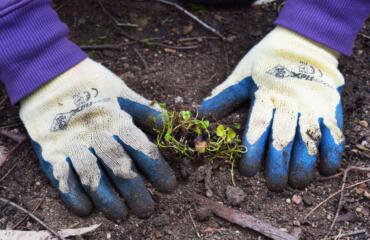A man wearing a smart suit and a surgical mask strolls along a residential street in Clayton. He enters a house with a “For Sale” sign out front and starts wiping the countertops and door handles with disinfectant wipes. Such is the daily routine of a real estate agent in the the COVID-19 reality of lockdowns and social distancing.
Ethan He is a director at local real estate agency First National Clayton JXRE, based in the middle of the ordinarily bustling Clayton shopping strip. Like everyone in his industry, he has ridden the shockwaves as the COVID-19 pandemic has reverberated, triggering a slowdown across the housing market nationally and a collapse in Melbourne’s auction clearance rate to below 30 per cent in April – the lowest on record.

But well before Victoria’s first wave of lockdown orders and the shut down of public auctions and home inspections back in March, He and fellow agents in Clayton were feeling the foreshocks emanating from China as the coronavirus took hold in Wuhan.
While Real Estate Institute of Victoria (REIV) data showed the median house price in metropolitan Melbourne increasing 3.7 per cent from December 2019 to March 2020 – before the pandemic impacts began to play out locally – in Clayton over that period the price fell sharply more than 24 per cent.
Clayton is one of Australia’s most multicultural suburbs, popular for its proximity to freeways and shopping centres, as well as its vibrant ethnic mix. Crucially, it also houses Monash University’s main campus. Research published in June by Victoria University shows that before the pandemic, international students accounted for 34.5 per cent of Clayton’s population – one of the highest concentrations in the nation – many of them Chinese.
Then, on February 1, the Australian government banned the entry of Chinese nationals, including many Chinese students who were due to fly in for the start of the academic year.
Ethan He and his colleagues could sense what was coming.
“We are a very investor based [suburb],” Tom Cao, the company’s operations manager, told The Citizen.
“There are lots of students and international people that live here for their studies or their work.”
As student numbers dwindled, and others moved back home with their parents, rental apartments in Sydney and Melbourne were left vacant. In Melbourne, the rental vacancy rate jumped from 1.6 per cent in March to a three-year peak of almost three per cent in April, and has edged even higher in May and June. Listings in inner Melbourne, which relies heavily on international tenants, leapt by more than 57 per cent between March and June.
In Clayton, Ethan He watched vacancy rates rise, and assessed the likely impact. “When this rate is higher, the owner has to chop the [rental] rate to become more competitive in the market.”
Some landlords, fearing that property prices would fall, converted their apartment listings from rental to sales. Data released by Domain showed a 50 per cent increase in the number of one and two-bedroom apartment sale listings in Clayton in March, compared with the same time last year.
“I have got some buyers [who] because of the change of income levels can’t afford a property anymore,” He said. Others had the money, but were holding off due to low confidence.
On top of these challenges, agents such as He and Cao have had to adopt an entirely new way of operating, given that that two of the most effective ways of selling – open home inspections and on-site auctions – are no longer possible.

Clayton real estate agent Ethan He says he and his colleagues could see what was coming well before the arrival of the virus in Melbourne forced the city into lockdown. Photo: Benjamin Silvester
First National Clayton has been conducting virtual auctions online. Buyers and sellers sign contracts from the safety of their own homes with electronic signatures. Home hunters and prospective tenants still have the option of private inspections by appointment. Before visiting a property, the agent asks potential buyers to fill in a questionnaire about their health, the health of people they have come in contact with and their travel history. During the inspection, the agent either waits outside or otherwise maintains a 1.5–metre distance with the buyer or tenant.
The changes initially created some confusion. Cao recalls an incident from the early days of the pandemic when a client kept closely tailing the agents as they moved around the property, trying in vain to create a little distance. “I guess people were confused as to what they could do and not do.”
In Clayton, the pandemic has also posed another sort of challenge. With a higher than average proportion of its population, many of them students, employed in cafes and restaurants, the suburb has been particularly vulnerable to the impact of the pandemic on the nation’s beleaguered accommodation and food services industry.
The lockdown has forced many students and workers out of their jobs, or to work fewer hours, meaning that some have struggled to pay their rent.
For the agents at First National Clayton, this has meant juggling the needs of tenants and landlords to try to reach a fair and sustainable outcome. Tenants in financial strife can apply for temporary rent discounts or deferrals.
Tom Cao acknowledges that most of those who apply legitimately need assistance. But he says it can be “a double-edged sword”. On one side are the landlords, who rely on the rental payments, and on the other are the tenants, who simply may be unable to pay.
The application process is a way to make the process quicker for the agent. “It weaves out all those who are trying to get a bit of assistance when they don’t need it. It’s probably one out of 10. But we have a lot of properties under our management, so even that is a lot a day,” says Cao.
When it appeared the pandemic spread was easing and the Victorian Government started easing restrictions in May, agents such as He were deeply relieved. After seven weeks of lockdown, public inspections and auctions were again possible, albeit with social distancing and other rules, and He was upbeat, noting that buyers who had been granted 90 days pre-approval on their loans were not seeking to extend their approvals – a good sign, he said.
While some buyers still preferred private inspections, he said, “I think after two weeks people will start to relax a little bit.”
However the respite was short-lived, with Melbourne returning to lockdown for six weeks from 8 July as COVID-19 cases have surged.
Nonetheless Ethan He – speaking to The Citizen before the resumption of stage three lockdown – expressed his confidence in Melbourne’s underlying strengths. “Melbourne is the most livable city in the world. So, I don’t have to worry about the real estate because people like it here,” he said.
But Domain’s Trent Wiltshire was more cautious. He cautioned that another shut down, as has since come to pass, would extend the economic slowdown. “That will mean more will lose their jobs, and will put a big dent in confidence.”
What this will mean for Cao and his team remains to be seen.
An article on First National Clayton’s website in May argued that increasing investor interest was a “golden opportunity for sellers in Clayton”.
But the agents, like the rest of us, are in the grip of forces largely beyond their control. The most recent REIV quarterly data shows the median price for houses in Clayton dropping more sharply than the Melbourne average, although unit prices were tracking slightly better than the city trend. These figures predate the latest lockdown restrictions.

Source: Real Estate Institute of Victoria
Melbourne house prices are reported to have dropped more than any other capital city as a result of the pandemic, with more to come. Analysis by Corelogic anticipates that the latest lockdown, which will remain in place until at least August 19, will “significantly disrupt” housing market activity.
Research by Victoria University’s Mitchell Institute shows that in April last year, 46,480 international students arrived in or returned to Australia. “In April 2020, this had fallen to 30.” Clayton is reported to have lost 2,500 residents in 2020.
This is part of a special reporting project Clayton 3168: Lockdown on the Strip. To see other reports, click here.



